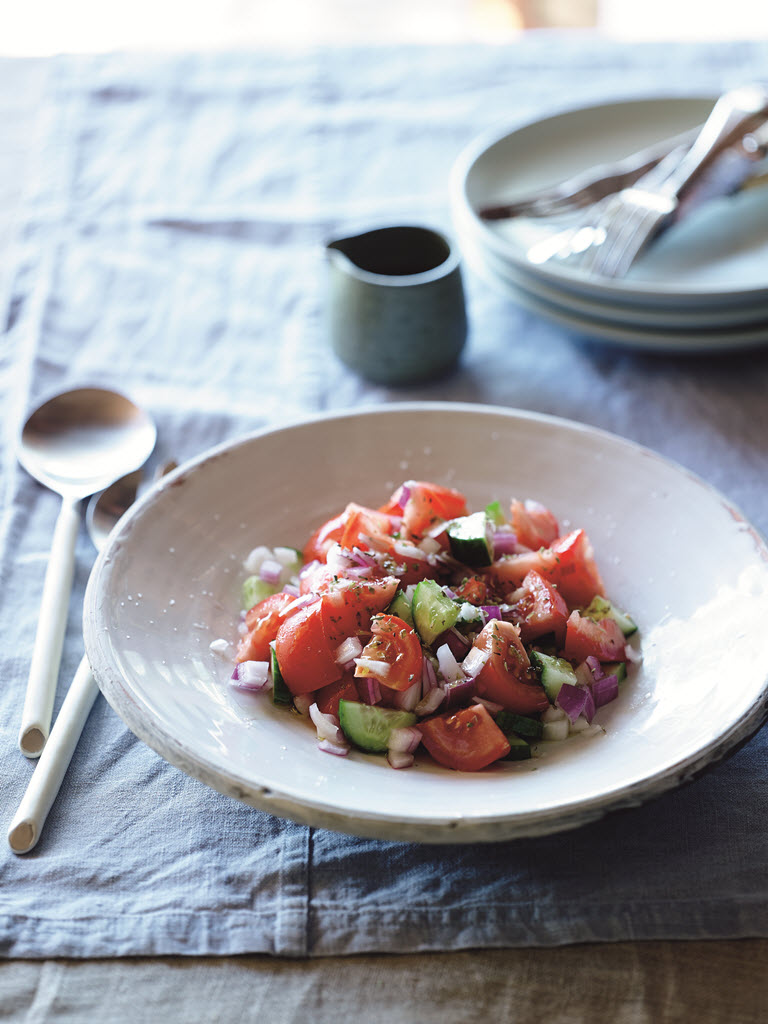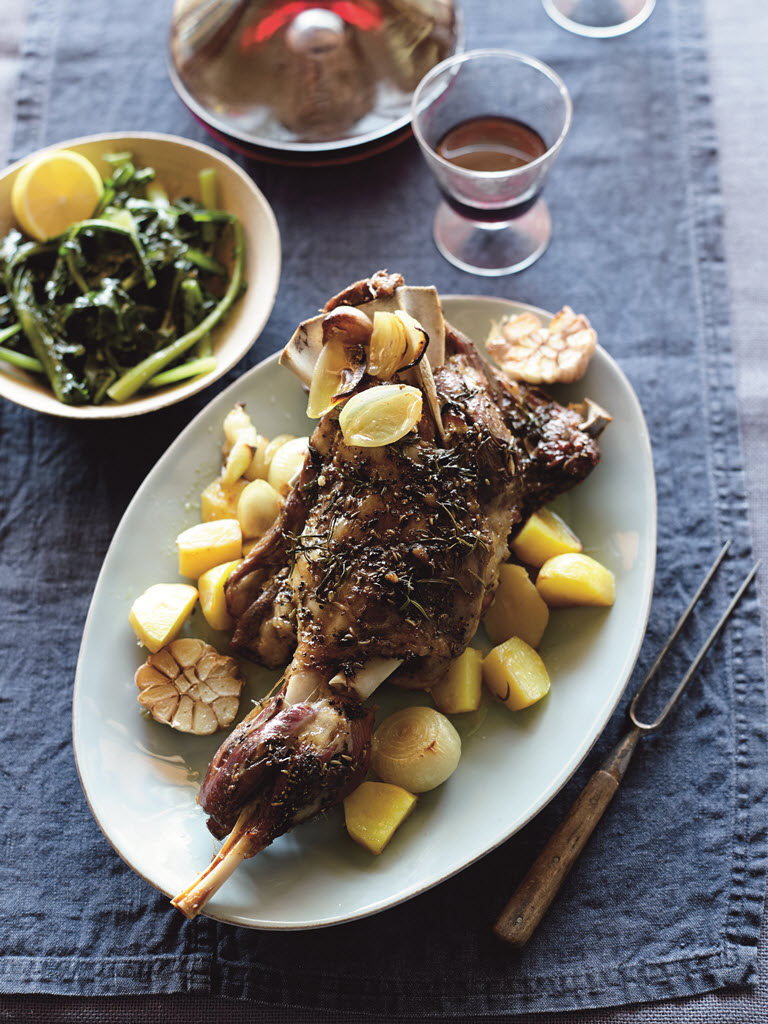Book Review: The Mediterranean Diet by Catherine Itsiopoulos
Written by Catherine Saxelby on Wednesday, 20 November 2013.

When we were planning our trip to the Greek Islands in 2009, I made sure we spent five days in Crete. After all, I had spent years sitting in lectures hearing about the famed Cretan Diet – the pinnacle of healthy eating and the Greek version of the Mediterranean Diet – and so no trip to Greece would have been complete for me without a visit to this large, historic, mountainous island.
What struck me most about Crete was how agricultural it was. On every piece of cultivatable land there were trees or crops of some sort growing – mostly groves of olive trees of all ages from youngish saplings to gnarled thousand-year-old specimens. And occasionally a field of fruit trees or nut trees as well as grains and vegetables.
The whole island looked fertile and productive, and was large enough to grow plenty to support its people. I can understand why it was so coveted by the early Greeks, Romans, Turks, Venetians and Italians.
As a fan of the famed Mediterranean Diet, I was intrigued by a new cookbook that focusses on the Greek version which has always had more plant foods - legumes, vegetables, salads, wild greens, herbs - and less pasta and bread.
"The Mediterranean Diet" by Dr Catherine Itsiopoulos (Pan Macmillan, $34.99) tells us how we know this diet is so healthy, what key foods are in it and how and why it protects against diabetes, heart disease, cancer, dementia and ensures longevity and a healthy weight.
She starts by explaining that the traditional diet was rich in plant foods, olive oil, fish and seafood. It has long been held up as a the "ideal diet" by many. Numerous studies point to it as the formula for a longer and healthier life. They date back to the first study by Ancel Keys in the 1960's called the "Seven Country Study" which showed that Cretan men had the longest life expectancy despite smoking and low incomes.
"The Mediterranean Diet is the most respected, well-researched and most-often prescribed diet in the world. Its positive health effects have been scientifically tested and proven for more than 60 years and the results are incontrovertible," she writes. From her research, she lists the benefits we can enjoy from a Mediterranean Diet. It:
- Prevents heart disease
- Prevents diabetes
- Prevents weight gain, promotes weight loss
- Promotes cancer recovery
- Slows Alzheimer's
- Is low in gluten
- Promotes longevity
- Is suitable for the whole family because it embraces all food groups
- Is suitable for entertaining
- Is inexpensive
- Is delicious! Many people fall off the diet bandwagon because the food is bland and tasteless.
15 key foods for Greek-style healthy eating
In the first part, Dr Itsiopolous spells out the key food proportions of this diet:
- Lots of olive oil, leafy greens, eggs, fruit, nuts, legumes, fermented dairy products (yoghurt and fetta), seafood
- A small amount of red meat and
- A miniscule amount of sugar.

She lists 15 key foods that make the Greek version stand out:
- Olive oil
- Olives
- Tomatoes
- Leafy green vegetables
- Broccoli and other cruciferous veges
- Onions and garlic
- Legumes
- Oranges, lemons and other citrus
- Blueberries and boysenberries
- Aromatic culinary herbs (oregano, basil, thyme, rosemary) and spices (cinnamon, cloves and nutmeg)
- Nuts
- Greek mountain tea or ironwort (Itsai tou vounou)
- Wine
- Fermented dairy – yoghurt and feta
- Fish and shell fish
Best of all, the bulk of the book is 80+ recipes that reflect Greek heritage and fit the guidelines outlined in the opening 50 pages (one-quarter).
You'll find all the usual Greek favourites here: from Moussaka, Stuffed eggplant, Tomatoes, zucchinis and capsicum stuffed with rice, to stifado, mussels and baked sardines, not forgetting Baklava, Greek shortbread and risogalo (rice pudding).
Oh and there's tzatziki, tarama fish roe dip, eggplant dip, skordalia (garlic mash), spankopitakia, stuffed vine leaves, Dolmades, octopus, Avoglemono soup and Horta (warm wild greens).
All salads are heavenly but here are three that caught my eye:
- Classic Village-style Greek Salad (pictured above) p.95
- Warm Artichoke & Broad bean salad p.98
- Beetroot, green runner bean, walnut and goat's milk feta salad p.101
The author
I believe Dr Catherine Itsiopoulos is the perfect author for such a book having researched the efficacy of the Mediterranean Diet in diabetes, heart disease and the metabolic syndrome in her role as associate professor at La Trobe University. As the child of Greek immigrants, she has seen lots of meals cooked at home by passionate and traditional cooks such as her mother and mother-in-law who are pictured in the book and are the creators of many of the recipes.
What I liked
 — I like that it's by an Australian author so the ingredients are familiar and the quantities are metric.
— I like that it's by an Australian author so the ingredients are familiar and the quantities are metric.
— The easy summary of the research behind the diet which keeps getting the nod of approval from nutritionists.
— Greek-style cooking suits our hot sunny climate and is big on flavour.
— Gorgeous food shots styled with rustic implements and rough cloth (think food porn) thanks to Caroline Velik's super styling.
— It may just surpass Tess Mallos' classic Greek Cookery volume I've had for years as my go-to bible for classic Greek recipes.
The bottom line
I recommend this book to those of you who are interested in adopting a more Greek-style Mediterranean approach to eating. If we all cooked the Greek Mediterranean way, we'd be a lot healthier.
I enjoyed reading this book and drooling over the recipes. It felt more of a homage to traditional Greek cooking than a diet cookbook.
I'll certainly be using it to cook up a couple of well-known Greek faves such as the slow-cooked shoulder of lamb with lemon and oregano (pictured) and that classic Greek side salad which never goes out of fashion.
Buy the book The Mediterranean Diet online from Booktopia.
Jemma O'Hanlon
The Good Stuff
The Boring Stuff
© 2025 Foodwatch Australia. All rights reserved
Website by Joomstore eCommerce





